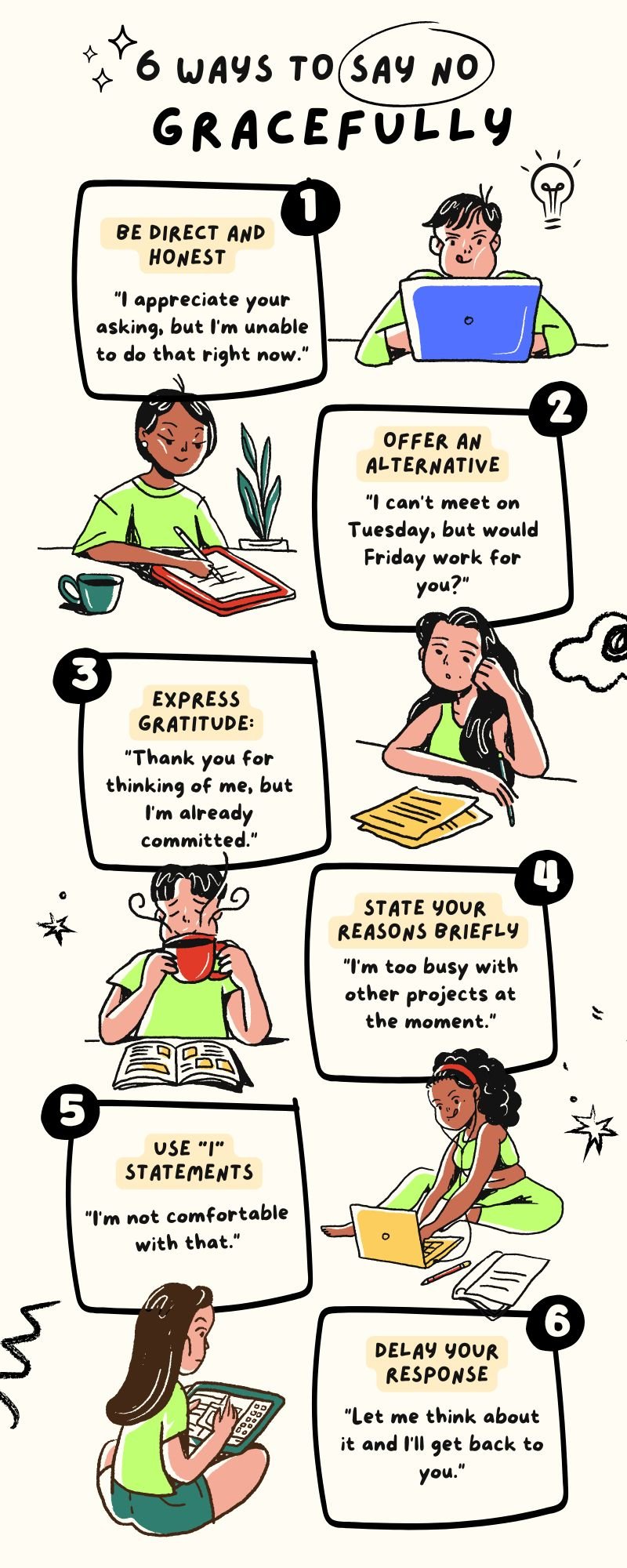We’ve been told “no” since we were young. Anything that looked exciting, our parents told us “no.” Whether it was asking for a second ice cream, going outside to play even when we had exams and needed to study, or saying “no” when we didn’t want to visit a boring relative’s house—our parents often said “no” to that too.
But as we grew up, did we really learn the art of saying no from them? Don’t you think you say yes too much? Have you become a yes person, and now it just makes you anxious?
Why We Struggle to Say No
Maybe it’s because you haven’t learned how to say no. We were not taught how. Maybe you didn’t understand situations when you were a child. When your parents asked you to do household chores and you said no, the result wasn’t a positive one for you because it was interpreted as backtalk and rudeness. For some, this may have led to not speaking up for ourselves as adults.

Why Do We Say Yes?
- Fear of Disappointing Others: Especially if they are friends or family, it’s hard to say no. We just think that they will be sad, and it might impact our relationship.
- Desire to Be Liked: We want people to like us, so we put in our best effort to impress them by saying yes. We try to gain approval or be liked by others.
- Pressure to Conform: When everyone around you says yes, it becomes hard and uncomfortable to say no. You are pressured socially, especially when your friends, family, or office colleagues arrange a trip, and you really don’t want to go.
- Overestimating Capacity: Sometimes, you genuinely think you can manage the tasks or commitments by saying yes, but later realize it’s too much for you.
- Wanting to Help: You may genuinely want to help, so you say yes.
- Habit: Maybe you don’t even know why you said yes—it’s like a reflex and a habit.
Most of us don’t say no because we feel guilty about how the other person would feel. Saying no is a difficult task for many of us.
Saying No to Our Bad Habits
We don’t even say no to our bad habits nowadays, often without realizing it. Like scrolling through our phones for hours. We feel the need to stay updated on unhealthy social media news, which is not at all important to us. But we keep doing it, losing our chance to deal with real problems or tasks.
The Importance of Learning to Say No
Learning to say no will save you from a lot of stress. It’s important for your well-being. Your most valuable asset is your time. You cannot use it solely to please others. Yes, helping is good, but you need to find a balance—you cannot always do everything for everyone. Use your time wisely.
When Should You Say No?
- When You Feel Uncomfortable: Maybe you are working on your task, and a colleague or boss hands over some tasks that are not yours, and you feel really uncomfortable. You’re thinking this is not fair—you’re not getting paid for their tasks, so why should you do it? That’s when you should be saying no.
- When You’re Pleasing Others at Your Own Expense: If you are unable to say no because you want to please others, your happiness and well-being are getting damaged. Learn to say no and break free from that mindset.
- When You’re Overloaded: You’ve been working all day or haven’t had any free time. Maybe you had a family issue that consumed your mind. At those moments, if you’re given tasks, you know you won’t be able to give your 100%. Say no.
- When Your Boundaries Are Being Crossed: A friend regularly asks you to lend them money. You’ve already helped them several times, but now it’s becoming a pattern that makes you doubt whether they will pay you back. This is a boundary that’s being crossed, and it’s important to say no to maintain your financial and emotional well-being. Or perhaps a colleague asks you to stay late every day to help with their workload, even though it’s not part of your job and you have other commitments. This is where your professional boundaries are being crossed.
- When You Don’t Have Time: You already have other priorities like your family, friends, gym, or personal projects. It’s okay to decline.

How to Say No
- Be Direct: “I appreciate you asking me, but I can’t take on any additional tasks right now.” This makes you look direct and clear, avoids confusion, and sets a clear boundary.
- Use the Sandwich Technique: Start with a positive statement, then say “no,” and end with another positive or offer an alternative. “Thank you for thinking of me. I’m not able to help you with this project, but I can assess it later if that helps.”
- Be Honest but Brief: “I’m focused on other priorities and can’t take this on right now.”
- Delay Your Response: “Let me think about it, and I’ll get back to you.” This will make it clear that you are not instantly ready to take on the task, so they might think twice before asking you next time.
Start Practicing Today
This blog was about making you realize when you should say no. Do not be someone who rejects everything every time. Then you are going to be in trouble. Learning when and how to say no in life is a skill that we all should master. Try it—if you are someone who faces difficulties saying no and you end up saying yes when you don’t want to. Try to say no to a minor request and notice how it feels. Gradually, you’ll see that you’re building the confidence to say no in more challenging situations. Just remember, saying no will not make you a bad person; it makes you someone who values their time and well-being.
